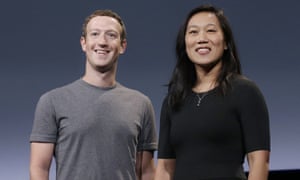
Mark Zuckerberg and Priscilla Chan have given $3bn to help cure all disease. Photograph: Jeff Chiu/AP
A world where billionaires were blunt and forthright, where they preferred pillaging the world to saving it, was far less confusing. The robber barons of the industrial era – from Carnegie to Ford to Rockefeller – did eventually commit some of their riches to charity but there was no mistaking one for the other. Oil and steel brought in the cash; education and arts helped to spend it.
Of course, the eponymous foundations were neither neutral nor apolitical. They pursued projects that were rarely at odds with US foreign policy and often shared many of its key ideological biases and presuppositions. From modernisation theory to democracy promotion, the civilising imperative behind them was not so hard to discern. Some of these foundations have eventually come to regret many of their dubious advocacy campaigns; the Rockefeller Foundation’s imprudent support for population control in India is just one example.
Today, when five of the world’s most valuable companies are technology firms, it’s very hard to see where their businesses end and their charity efforts begin. As digital platforms, they power diverse industries and sectors from education to health to transport and thus have an option that was not available to the oil and steel magnates of yesteryear: they can simply continue selling their core product – mostly hope, albeit wrapped up in infinite layers of data, screens and sensors – without having to divert their funds into any nonproductive activities.
The Chan Zuckerberg initiative, a limited liability company (a somewhat unusual format for a charity), was set up by Mark Zuckerberg and his wife, Priscilla Chan, in December 2015, ostensibly to share their wealth with the rest of us. It has recently been in the news thanks to its founders’ ambitious commitment – to the tune of $3bn – to cure all disease.
Zuckerberg can surely afford this, given how little tax his company is paying: in the UK, its tax filings for 2015 show revenues of £210.7m, on which the company paid just £4.17m of taxes – an effective rate of 2% (itself a 1,000-fold increase on what it paid in 2014). Facebook, however, also managed to generate a tax credit of £11m, which it can use to reduce its future tax burden. The disease of tax avoidance is unlikely to be cured by the Chan Zuckerberg initiative.

Henry Ford in his first car, built in 1896. Photograph: Library of Congress/Getty Images
To speak of “philanthrocapitalism” here – as many have done, either to praise or bury it – seems misguided, if only because such projects bear so little resemblance to philanthropy proper. One doesn’t have to admire Ford or Rockefeller to notice that their philanthropic endeavours, whatever their real political goals, were not supposed to make extra cash. But is it really so with our new tech barons?
While Zuckerberg’s commitments in the health sector are still too recent and ambiguous to judge, he has a more extensive history in education. Following Zuckerberg’s personal commitment of $100m dollars to schools in New Jersey – an investment that is yet to bring the desired results – the Chan Zuckerberg initiative has invested in companies that supposedly help expand educational opportunities in the developing world.
Thus, it has poured money into Andela, a Lagos-based startup that trains coders, joining the likes of Google (via GV, its venture fund) and Omidyar Network, a similar philanthropic investment firm belonging to another tech billionaire. A few weeks later, one of Andela’s co-founders left to found a payments startup: apparently, there are a lot of arbitrage opportunities in saving the world.
That one can never fully understand what drives these investments, a profit motive or a genuine desire to help out, is a feature, not a bug. If the logic driving the Fords and the Carnegies was to atone for the sins of rapacious capitalism, the logic of the Zuckerbergs and the Omidyars is to convince us that rapacious capitalism, fully unleashed on society, will do lots of good.
The Chan Zuckerberg initiative also invested in BYJU, an Indian company that has developed an app that teaches students science and maths. A noble endeavour, but what attracted Zuckerberg to the firm was, by his own admission, its heavy reliance on personalised learning, which, of course, is only possible when large troves of user data are recorded and analysed. Does that remind you of any giant tech company?
This celebration of personalisation is also present in another educational project supported by Zuckerberg – a learning software made by a company called Summit Basecamp. The company has the luxury of having 20 Facebook staffers, from engineers to product managers, helping it with growth and expansion – the result of Zuckerberg touring one of its schools in 2013. And expand it did: according to the Washington Post, its software is now used by 20,000 students in more than 100 schools.

The Chan Zuckerberg initiative has poured money into Andela, a Lagos-based startup that trains coders. Photograph: Mohini Ufeli/Andela
Parents of these students can hope that Summit Basecamp will keep its word and that no personal data will ever leave the company. Such promises won’t be any more reassuring than those of the founders of WhatsApp, who, on being acquired by Facebook, promised to defend their users’ personal data, only to announce, a few months ago, that it will be shared with Facebook.
Zuckerberg also joined the rest of the Silicon Valley elite, from Bill Gates to Laurene Powell Jobs, the widow of Steve Jobs, in investing in AltSchool, a startup founded by a former Google executive, which takes personalised learning to a whole new level. In a good Taylorist fashion, its classrooms feature cameras and microphones so that any glitches inherent in the learning process can be analysed and engineered away. AltSchool now wants to expand by selling licences to its software to other schools.
What passes for philanthropy these days is often just a sophisticated effort to make money on engineering the kinds of rational, entrepreneurial and quantitative souls that would delight at other types of personalisation. Such learning is, of course, well suited to the needs of consulting firms and technology giants. A recent profile of AltSchool in the New Yorker mentioned that its students read the Iliad armed with a spreadsheet where they mark how many times the theme of “rage” occurs in the text. Such schools can produce excellent auditors; poets, however, might need an alternative, to, well, the AltSchool.
The very same technology elites are also backing the charter school movement – a longrunning effort to bring more competition to the educational sector by supporting privately run but publicly funded educational initiatives. From Gates to Zuckerberg, technology billionaires are vocal defenders of this movement. It won’t be surprising if they deploy their big data weapons to advance the argument that the traditional educational system must be completely overhauled.
We should be careful not to fall victim to a perverse form of Stockholm syndrome, coming to sympathise with the corporate kidnappers of our democracy. On the one hand, given that the new tech billionaires pay very little tax, it’s not surprising that the public sector would fail to innovate as quickly. On the other, by constantly giving the private sector a head start through technologies that they own and develop, the new tech elites all but ensure that the public would rather choose slick but privatised technological solutions over quaint, but public, political ones.
That we can no longer differentiate between philanthropy and speculation is an occasion to worry, not celebrate. With Silicon Valley elites so keen on saving the world, shouldn’t we also ask who will eventually save us from Silicon Valley?
No comments:
Post a Comment